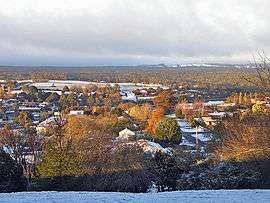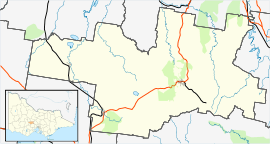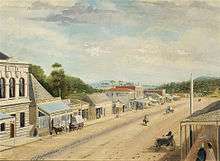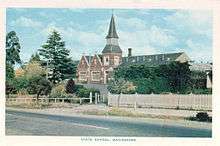Daylesford, Victoria
| Daylesford Victoria | |||||||
|---|---|---|---|---|---|---|---|
 Daylesford as seen from Wombat Hill | |||||||
 Daylesford | |||||||
| Coordinates | 37°21′0″S 144°09′0″E / 37.35000°S 144.15000°ECoordinates: 37°21′0″S 144°09′0″E / 37.35000°S 144.15000°E | ||||||
| Population | 2,565 (2011 census)[1] | ||||||
| Established | 1852 | ||||||
| Postcode(s) | 3460 | ||||||
| Elevation | 616 m (2,021 ft) | ||||||
| Location |
| ||||||
| LGA(s) | Shire of Hepburn | ||||||
| State electorate(s) | Macedon | ||||||
| Federal Division(s) | Ballarat | ||||||
| |||||||
Daylesford is a spa town located in the foothills of the Great Dividing Range, within the Shire of Hepburn, Victoria, Australia, approximately 115 kilometres north-west of Melbourne. First established in 1852 as a gold-mining town, today Daylesford has a population of 2,565 as of the 2011 census.[1]
As one of Australia’s few spa towns, Daylesford is a notable tourist destination. The town’s numerous spas, restaurants and galleries are popular alongside the many gardens and country-house-conversion styled bed and breakfasts.[2]
The broader area around the town, including Hepburn Springs to the north, is known for its natural spring mineral spas and is the location of over 80 per cent of Australia's effervescent mineral water reserve.[3] The Daylesford wine region is fast becoming known as Australia's best Pinot growing region, boasting continuous gold medals and 95 point plus wines.
History

Prior to European settlement the area is thought to have been occupied by the Djadja Wurrung Aborigines. Pastoralists occupied the Jim Crow and Upper Loddon districts following white settlement in 1838. In 1848, Irish immigrant John Egan took up land on the future town site then known as Wombat Flat. He and a party of searchers found alluvial gold in 1851 on ground now covered by Lake Daylesford initiating the local gold rush. Other finds quickly followed. With the finding of alluvial gold a town site was surveyed and founded in 1852. Initially called Wombat, it was renamed Daylesford.[4]
In 1859 around 3400 diggers were on the local diggings. The post office opened on 1 February 1858 [5] and a telegraph office was opened in August 1859.[6] Daylesford was declared a municipality in 1859 and a borough in the early 1860s.[4]
By the 1860s the alluvial gold was exhausted and a shift to quartz reef mining began. This continued on and off into the 1930s. In later years Daylesford became associated as being a fashionable spa resort, but fell out of favour in the Great Depression.[4]
Climate
At 616 metres (2,021 ft) above sea level, it has a cooler, wetter climate than Melbourne. Summer (January–February) temperatures range from 10 to 37 °C (50 to 99 °F), while July temperatures are cold, ranging from about 1–2 °C (34–36 °F) to 9 °C (48 °F). Annual precipitation, occasionally falling as snow, averages about 870 mm (34 in) but has ranged from 445 mm (17.5 in) to over 1,350 mm (53 in) per year.
Economy
.jpg)
With 65 mineral springs, the Daylesford-Hepburn Springs region accounts for more than 80 per cent of Australia’s known mineral water springs.[7] As a result, the region has a number of spa developments including Hepburn Bathhouse & Spa, Mineral Spa at Peppers Springs Retreat and Salus Spa, Lake House. The town is also known for hosting a number of annual events including the Chillout Festival held during the Victorian Labour Day long weekend in March each year the largest gay and lesbian festival in rural and regional Australia, the Harvest Week Festival and the Lavandula's Festivals and the Hepburn Springs Swiss Italian Festival celebrating the town's Swiss-Italian heritage.[8]
Major industries in the economy of Daylesford today are healthcare, accommodation and food, and retail trade respectively.[9]
Education

The town is served by a number of primary schools and one public secondary school, Daylesford Secondary College. The town's Secondary College was originally established as a mining school, in 1890. In 1961 the college was established as the sole provider of secondary education in the Shire of Hepburn and has just over 500 pupils.[10] Daylesford Primary School, formerly known as Daylesford State School, is the oldest and longest-running provider of primary education in Daylesford.[11] Other primary schools in the area include St. Michael's Primary School and Daylesford Dharma School. Daylesford Primary School is host to an annual book fair which first started in 2010 and has since begun operating as an annual book fair, where used and unwanted books are donated to raise funds that go towards improving children's literacy.[12]
Transport
The Midland Highway runs directly through the town linking it with Castlemaine in the north and Ballarat in the south-west. The Western Freeway is the main route linking Daylesford to the state capital.
The railway to the town closed in 1978.[13] The railway layout at Daylesford station was unusual in that the lines from Creswick and Carlsruhe both entered the station from the same end.[14] The Daylesford Spa Country Railway currently operates a Sunday tourist service to Musk and Bullarto along the line towards Carlsruhe.
Sport
The town has an Australian Rules football team competing in the Central Highlands Football League.[15] Daylesford is also home to the Daylesford and Hepburn United Soccer Club also known as the Saints or the Sainters. The Saints have won four league titles in their 20-year history along with two cup finals.[16]
Gallery
 Daylesford circa 1908
Daylesford circa 1908.jpg) Park in autumn
Park in autumn
References
- 1 2 Australian Bureau of Statistics (31 October 2012). "Daylesford (State Suburb)". 2011 Census QuickStats. Retrieved 2014-09-19.
- ↑ http://www.drive.com.au/motor-news/woodend-to-daylesford-20100824-13o2k.html
- ↑ http://www.tourism.vic.gov.au/images/stories/Victoria%20s%20Spa%20and%20Wellbeing%20Tourism%20Action%20Plan%202011%20-%202015%20final%20with%20cover.PDF
- 1 2 3 http://www.daylesford-vic.info/daylesford-history.php?maxi
- ↑ Freeman, Hugh H; GeoffT. White (2001). The Numeral Cancellations of Victoria. Melbourne: The Royal Philatelic Society of Victoria. ISBN 0-947345-16-7.
- ↑ Gibbs, Christine (1984). History of Postal Services in Victoria. Melbourne: Australia Post.
- ↑ "Victoria's Spa and Wellbeing Action Plan 2011" (PDF). Tourism Victoria. Retrieved 24 October 2011.
- ↑ "Daylesford Festivals, Markets and Shows". Retrieved August 12, 2016.
- ↑ http://www.abs.gov.au/AUSSTATS/[email protected]/Latestproducts/201021011Industry12007-2011?opendocument&tabname=Summary&prodno=201021011&issue=2007-2011&num=&view=
- ↑ "Daylesford Secondary College History". Retrieved 3 September 2014.
- ↑ "Daylesford Primary School History". Retrieved 3 September 2014.
- ↑ "Daylesford Primary School calls for donations for book fair". Retrieved 3 September 2014.
- ↑ Osborne, Murrell (1978). Timber, Spuds and Spa. Australian Railway Historical Society. ISBN 0-85849-023-4.
- ↑ http://www.signaldiagramsandphotos.com/My_Web_pages/VR/Northern_&_Midland/9'46.htm
- ↑ Full Points Footy. "Daylesford". Archived from the original on July 24, 2008. Retrieved 2008-07-25.
- ↑ http://www.daylesfordsoccerclub.com/
Sources
- Daylesford Advocate, Mercury, Express, Mercury-Express. 1859-1870
External links
| Wikimedia Commons has media related to Daylesford, Victoria. |
-
 Daylesford travel guide from Wikivoyage
Daylesford travel guide from Wikivoyage
- Information Centre/ Official regional government tourism site. - Daylesford tourism
- Daylesford - Visit Victoria tourism
- Daylesford Historical Society – History of Daylesford